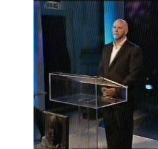On Monday 4th December, BBC1 broadcast the 32nd annual Richard Dimbleby Lecture featuring Dr J. Craig Venter and his vision of “a DNA-driven world” (00:03:54).
|
|
| David Dimbleby introduces The Richard Dimbleby Lecture 2007: Dr J Craig Venter – A DNA-Driven World (BBC1, Dec 4 2007, 22:35) |
As David Dimbleby, son of the late Richard Dimbleby, states in his introduction to the lecture, Venter is widely recognised as one of the “pioneers” (00:01:32) in this area. His achievements include the founding of Celera Genomics – a somewhat controversial contributor to the Human Genome Project; The Institute of Genomic Research; and more recently Synthetic Genomics – a company whose work has “opened the door to the creation of the first artificial life form on the planet” (00:00:58). According to Dimbleby, the purpose of the lecture was to hear “simply, clearly and without gimmicks” (00:01:24) what synthetic biology might hold for the future.
|
|
| Dr J. Craig Venter presents The Richard Dimbleby Lecture 2007: Dr J Craig Venter – A DNA-Driven World (BBC1, Dec 4 2007, 22:35) |
Venter describes synthetic biology as “life which is forged not by Darwinian evolution but created by human intelligence” (00:05:54), and while his lecture culminates in consideration of artificial lifeforms “capable of creating energy”(00:03:26) and designed to “combat climate change” (00:03:39) he covers a number of additional topics. These include the need to build a “scientifically-literate society” (00:05:24) and the “need to move toward a preventative philosophy” (00:15:20) in medicine and health care. A full transcript of the lecture is available on the BBC website here.
Throughout the lecture, Venter only mentions the ethical issues implicit within his work once and specifically in the context of the process of ongoing ethical review at Synthetic Genomics, a “unique and significant feature”(00:38:13) which he suggests is often “overlooked by the news media” (00:38:17). Indeed Venter himself instigated the assessment of the ethical implications of synthetic biology and the creation of ‘minimal genome’ organisms in the laboratory (see Cho et al., Science, 10 December 1999: Vo. 286. No. 5447, pp. 2082-2090). Within this assessment, a number of ethical issues raised by synthetic biology are identified including:
- the investigation of the ‘minimal genome’ as contributing to reductionism
- the creation of artificial life as an example to scientists ‘playing God’ in the laboratory
These issues are discussed at length by Cho et al. (1999), however, within his lecture Dr Venter appears to suggest that ethical concerns associated with such organisms may be addressed simply by “strict containment” (00:38:38) and a designed inability to survive outside of the laboratory. Given this, the 2007 Dimbleby lecture might be best used as a resource for detailed information on the kinds of problems artificial life and synthetic biology could be used to address, particularly in relation to bioremediation and the production of green energy. However, any bioethical discussion of the issues they raise might be best informed by alternative sources, for example Cho et al. (1999) or Rinaldi (2004) “A new Code for Life”, EMBO reports, Vol 5, No 4: pp. 336-339.
The Richard Dimbleby Lecture 2007: Dr J Craig Venter – A DNA-Driven World was first broadcast on BBC1 on December 4th 2007 at 22.35 (TRILT identifier: 00778B33). The programme is 45 minutes in length.


[…] This section focuses on how, in the future, we may be able to “hijack living systems at the molecular level” (00:33:30) and engineer them to do what we want. While not strictly bioremediation, Kaku explores how the function of one of the proteins involved in photosynthesis in plants could be hijacked in order to produce a ‘paint’ that can be used to generate solar power. Visions of the Future presents this application of nanotechnology as relatively ethically unproblematic, indeed it may be seen as ethically advantageous in that the paint produced by this process is far more transportable – say to India, China or Africa – than conventional silicon solar panels. Further, since this ‘hijacking’ seems little different from the use of genetic modification to create bacteria capable of producing human insulin (see Genetic engineering on the BBC Bitsize website, or Sticky ends on the Science Aid: Genetic Engineering site), it may present fewer bioethical dilemmas than, for example, Craig Venter’s use of ‘artificial life’ for a similar purpose (see the BioethicsBytes post “A DNA-Driven World” – Craig Venter’s vision for synthetic biology). […]
we are looking for a copy of the DNA driven world for a Cambridge school in South Africa. if you could put us in contact with someone. thank you
Barbara,
A streamed version of Craig Venter’s Dimbleby lecture is available here, on the Google Video site. Google Video also allows the content to be downloaded as an mp4 file which will play though Quicktime for example. Please note that the timings given in the post may not match exactly with the location of quotes in the Google Video copy of the lecture.
Enjoy!
Bonnie.
hi Craig, we need your Algie fuel developed soon as poss can I help?
is there any available records of his speech online?